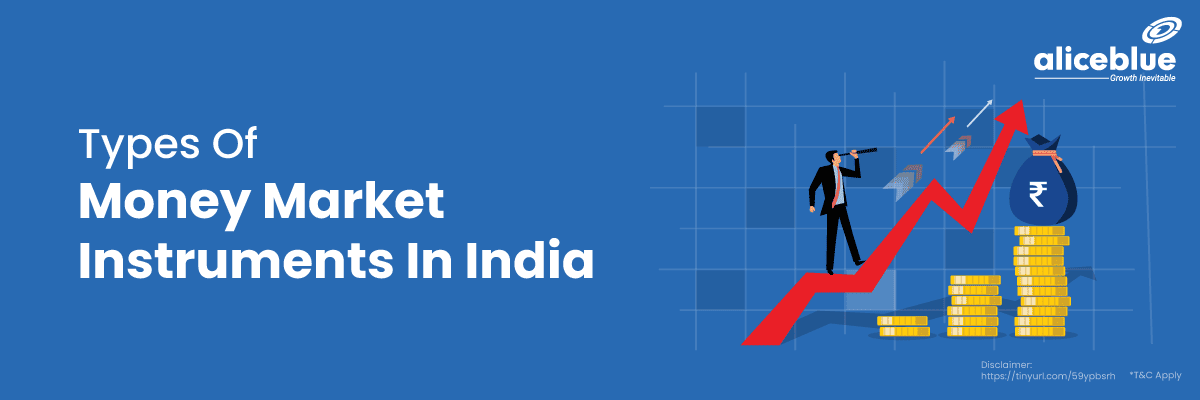Types of money market instruments in India include certificates of deposit (CD), treasury bills, commercial papers, repurchase agreements, and bankers’ acceptances. These instruments offer short-term borrowing and lending opportunities, typically used by financial institutions and corporates for efficient liquidity management.
Content :
- Money Market Instruments Meaning
- Types Of Money Market Instruments
- Types Of Money Market Instruments In India – Quick Summary
- Different Types Of Money Market Instruments – FAQs
Money Market Instruments Meaning
Money Market Instruments are financial tools designed for short-term borrowing and lending, usually within a year. They provide high liquidity and minimal risk, ideal for investors and companies to manage temporary cash needs. Common types include Treasury bills, commercial paper, and certificates of deposit.
Types Of Money Market Instruments
Types of Money Market Instruments include Certificates of Deposit (CD), Treasury Bills, Commercial Papers, Repurchase Agreements, and Banker’s Acceptance, which serve as secure, short-term investment options. They provide quick liquidity and are often used by organizations for managing temporary financial gaps.
Certificate of Deposit (CD)
Certificate of Deposit is a fixed-term financial instrument banks issue, offering a higher interest rate than savings accounts. CDs have a fixed tenure, typically from a few months to several years. Investors benefit from stable returns, but early withdrawal may incur penalties. They are suitable for risk-averse individuals seeking predictable earnings.
An Indian bank, like HDFC, offers CDs with a fixed tenure and interest rate, allowing investors to deposit money for a set period, ranging from 7 days to 10 years, for a guaranteed return.
Treasury Bills (T-Bills)
Treasury bills are short-term government securities; t-bills have maturities up to one year. Sold at a discount and redeemed at face value, they offer a safe, risk-free return backed by the government. This makes them ideal for conservative investors and helpful in managing cash with guaranteed returns.
The Government of India issues T-Bills typically through auctions, where investors like mutual funds or banks can buy them. These T-Bills, with maturities of 91, 182, or 364 days, are secure investments, offering a return upon maturity based on the auction price.
For the latest information on government bonds, T-bills, and more, you can visit the Alice Blue Rise page.
Commercial Papers
Commercial Papers are unsecured short-term debt instruments issued by corporations; Commercial Papers are used for financing immediate expenses. Maturities usually under 270 days provide higher yields than T-Bills but carry more risk. Corporations favor them for their quick funding capabilities and flexible terms.
Indian corporations like Reliance Industries issue Commercial Papers as a quick way to raise short-term funds. These unsecured notes typically mature within 7 to 270 days and offer higher returns than traditional bank deposits.
Repurchase Agreements
Repurchase agreements are a form of short-term borrowing; they involve selling securities with an agreement to repurchase them at a higher price. Commonly used by banks for overnight or short-term funding, they offer high liquidity and are secured, minimizing risk.
The Reserve Bank of India (RBI) conducts repurchase agreements (repos) with commercial banks. In this, banks sell government securities to the RBI with an agreement to repurchase them at a future date, thus managing short-term liquidity.
Banker’s Acceptance
Banker’s Acceptance is a short-term debt instrument. It is issued by a company and guaranteed by a bank. Often used in international trade, they are considered safe due to bank backing and are traded at a discount. They typically have maturities ranging from 30 to 180 days, providing a reliable funding source for traders.
An Indian textile exporter receives an order from a European buyer. To ensure payment, the exporter uses a Banker’s Acceptance issued by their bank, like State Bank of India. This document guarantees the payment to the exporter within a set period, usually up to 180 days, once the goods are delivered.
To understand the topic and get more information, please read the related stock market articles below.
Types Of Money Market Instruments In India – Quick Summary
- The main types of Money market instruments are Treasury Bills, Certificates of Deposit (CD), Commercial Papers, Banker’s Acceptance, and Repurchase Agreements.
- Money market instruments are used for short-term loans and investments, often for less than a year. They are safe and easy to convert to cash, helping people handle their money smoothly.
- Certificate of Deposit (CD) is a savings certificate with a fixed maturity date and interest rate, usually issued by banks.
- Treasury Bills are short-term government securities with a maturity of up to one year, sold at a discount.
- Commercial papers are unsecured and, with short-term maturity, are used by corporations for operational financing.
- Repurchase Agreements is a short-term loan where securities are sold and agreed to be repurchased later at a higher price.
- Banker’s Acceptance is a short-term credit investment created by a non-financial firm and guaranteed by a bank.
- Open a zero-charge demat account with Alice Blue and kickstart your journey in investing.
Different Types Of Money Market Instruments – FAQs
1. What are the types of money market instruments?
The types of money market instruments include Certificates of Deposit (CD), Treasury Bills, Commercial Papers, Repurchase Agreements, and Banker’s Acceptance.
2. What is the money market?
Money Market Instruments are short-term financial tools for borrowing and lending money, typically for less than a year. They offer high liquidity and low risk, making them popular among investors for managing cash flow efficiently.
3. How many instruments are there in the financial market?
The three main types of Financial Instruments are Derivative Financial Instruments, Cash Instruments, and Foreign Exchange Instruments.
4. What are the four main characteristics of money market instruments?
The main characteristics of money market instruments include high liquidity, short-term maturities, low risk, and modest returns, making them ideal for short-term financial management.
5. Who regulates the money market?
RBI regulates the money market in India.
6. What are the functions of money market instruments?
The primary function of money market instruments is to facilitate short-term borrowing and lending, providing a means for governments, corporations, and financial institutions to manage liquidity and meet immediate funding needs efficiently.
7. Is the money market risk-free?
Money market investments are not entirely risk-free. They have low risk compared to other investments but can still face issues like inflation and default risks, potentially affecting returns.
We hope that you are clear about the topic. But there is more to learn and explore when it comes to the stock market, commodity and hence we bring you the important topics and areas that you should know:






